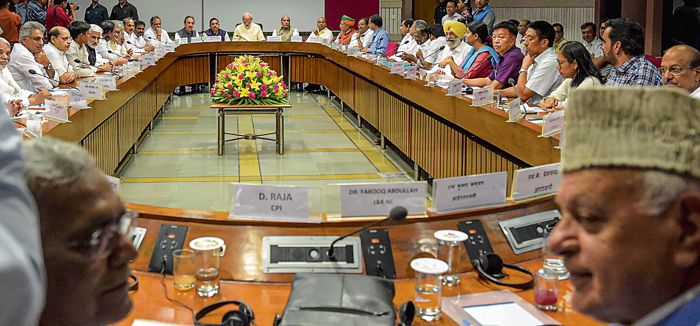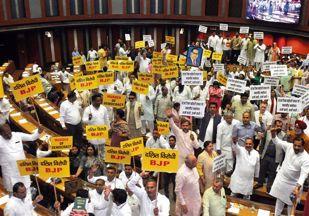
Dissonance: An all-party meeting on cutting salaries and MPLADS funds would have signalled that the political parties are together.
Arati R Jerath
Arati R Jerath
Political commentator
It is unfortunate that politics has shaped much of the Modi government’s response to the outbreak of the coronavirus pandemic, arguably the worst crisis to hit humanity in recent times. The twin decisions to impose salary cuts on Members of Parliament and suspend for two years the disbursement of funds for a prized perk, the Members of Parliament Local Area Development Scheme (MPLADS), are the latest in a series of measures that have driven a wedge between the ruling dispensation and the Opposition at a time when a unified political response would have reassured a worried nation.
The objectives are laudable. The money released by the salary cuts and MPLADS kitty will be used to mitigate the devastation wrought by the pandemic on the nation’s health, economy and social fabric. However, the manner in which the decision was taken has created dismay. Like with other moves ever since Covid-19 hit India, notably the midnight national lockdown announced abruptly, there was no consultation or prior warning although there was ample opportunity to get the Opposition on board.
Prime Minister Narendra Modi was to meet all parliamentary party leaders later in the week. Had he observed conventional democratic norms, he would have discussed the move at that meeting, crafted a consensus and then got Cabinet approval for the decision. Alternatively, he could have tapped the opposition leaders on the issue in a flurry of phone calls he made to party chiefs, former prime ministers and former presidents last week. The exercise was touted as an outreach to discuss the coronavirus pandemic and seek cooperation. But it seems not much was said beyond the usual exchange of pleasantries. The impending cuts were not part of the conversation.
Modi may have missed a trick here. An all-party agreement on cutting salaries and MPLADS funds makes for great optics. It would have sent out a powerful message that the political class stands together and is committed to making sacrifices for the nation at a time of grave crisis. Modi could have positioned himself as the elder statesman who crafted the consensus, an Atal Bihari Vajpayee 2.0.
Instead, the arbitrary manner in which an MP’s entitlement has been snatched away has reinforced fears of another attack on democratic institutions and further erosion of Parliament’s supremacy.
It is ironic that the suspension of a controversial scheme like MPLADS has raised the red flag about democratic institutions. Introduced by PV Narasimha Rao in 1993, the scheme was seen even then as a ‘gift’ to MPs by a minority government worried about survival. Ostensibly, the funds — Rs 1 crore at that time — were to be utilised by the MPs for development-related activities in their constituencies.
However, over the years, there have been allegations of corruption, lack of transparency in the execution of projects and virtually no accountability. In at least three reports since 1998, the Comptroller and Auditor General of India has pointed out weaknesses and lapses in the implementation of the scheme. It has also red-flagged specific contracts over the years, raising questions about expenditure by some MPs.
Interestingly, the limit was raised from Rs 1 crore to Rs 2 crore by the Vajpayee government, which, as a coalition government, was also dependent on the goodwill of MPs. And then the next coalition, Manmohan Singh’s UPA government, hiked the amount to Rs 5 crore.
Obviously, Modi has no such compulsions. He heads a full majority government with virtually no opposition to counter him. He rules Parliament with an iron fist and in his second term, has shown how easily it can be manipulated to suit his agenda. The passage of the triple talaq bill and the revocation of Article 370 from J&K are just some examples of his government’s ruthless manoeuvring of procedures and numbers in the face of widespread criticism.
The steady emasculation of Parliament as an institution is evident in other subtle ways. It took the government four months after it was re-elected in 2019 to constitute the mandated standing committees. These are oversight bodies which examine the budgets and decisions of government ministries and call them to account.
The delay in the formation of these committees sparked off speculation that the Modi government is considering scrapping them altogether. While it eventually did not, it did introduce a major change. It appointed a BJP MP as head of the crucial finance committee, a post which was traditionally given to a member of the largest opposition party. So, Manmohan Singh headed the finance committee under the Vajpayee government and Yashwant Sinha headed it when Manmohan Singh assumed office as prime minister. In his first term, Modi honoured the convention and Veerappa Moily of the Congress was appointed the chairman. But this time, the post has gone to Jayant Sinha of the BJP, following the controversies that marred the deliberations of the committee during demonetisation.
The Modi government also seems to have done away with the post of Deputy Speaker of the Lok Sabha. This post, too, has traditionally been held by an appointee of the largest opposition party. It is now vacant and the Modi government seems to be in no hurry to fill it.
Perhaps the most pertinent question was asked by CPI (M) general secretary Sitaram Yechury. He wanted to know whether the Modi government will scrap its ambitious and extravagant project to redevelop the Central Vista to rebuild the economy after the Covid havoc.
It is indeed unfortunate that the political class is bickering. Chief ministers of Opposition-ruled states have complained that they were kept in the dark about the national lockdown. While all are upset about the lack of financial aid, Delhi CM Arvind Kejriwal has gone so far as to allege partisan behaviour by the Centre in the disbursal of funds. So has Congress MP Shashi Tharoor who recently tweeted that BJP-ruled Gujarat has received more money than CPI (M)-ruled Kerala which is among the worst hit states.
Surely this kind of dissonance between the ruling dispensation and the Opposition cannot help India to beat back the epidemic and its aftershocks.
Join Whatsapp Channel of The Tribune for latest updates.




























